- Home
- Lauren Oliver
The Spindlers Page 2
The Spindlers Read online
Page 2
She did not know what the spindlers did with the souls that they stole. Anna had claimed that she did not know either, although Liza had never quite believed her; Anna had always gone white when Liza mentioned them, as though someone had just punctured her chin and drained all the color from her face.
She did know that spindlers were practically indestructible. Even brooms would not kill them.
She did not know how to kill a spindler, or whether it was even possible.
And that frightened her.
That night, she washed her face and put on her pajamas and brushed her teeth—standing as far as possible from not-Patrick, who brushed his teeth dutifully beside her (another thing the real Patrick, who despised brushing his teeth and used as many tricks as possible to get out of it, would not have done).
Both of them were now pretending that everything was back to normal. It was a game they had entered into by silent agreement. Liza pretended not to know that Patrick was not really Patrick; and Patrick pretended both that he was himself and that Liza believed that he was himself. It was a difficult game, but fortunately Liza was used to playing games with her brother.
“Will you tell me a story?” the not-Patrick asked, as the real Patrick might have after they had both rinsed and placed their toothbrushes side by side in the toothbrush stand. Liza was careful to swivel her bristles away from his so they would not be touching.
“Not tonight,” Liza said, struggling to keep her voice normal and cheerful. Liza often snuck into the real Patrick’s room and told him stories late into the night.
“Why not?” He stared at her with large, hollow eyes.
Liza knew what he was doing. He was trying to lure her into his bedroom, where the spindlers would be waiting—hundreds of them—to steal her soul as soon as she closed her eyes.
“I’m too tired tonight,” she said. “Maybe tomorrow night.”
Not-Patrick shrugged. “Fine,” he said, his eyes flashing angrily. “I didn’t want to hear one of your stories anyway.” Liza thought about the letters lined up on the rim of his bowl this morning: I H-A-T-E Y-O-U. She thought, too, of their argument last night, and how it was her fault that Patrick had forgotten to say the broom charm.
And yet only yesterday Patrick had run up to her, laughing, cupping a tiny rose-colored newt in his muddy palms, and asked her whether they could keep it together, as a pet. And in that second her hatred for the spindlers was so intense she had to grip tightly to the porcelain sink.
She waited until he had gone into his bedroom and closed the door. Then she shoved her feet into a pair of her favorite sneakers without bothering to put on socks, and padded carefully down the broad, carpeted stairs into the living room. For a moment she paused, listening to her parents’ muffled voices; they were in the den.
“It’ll be all right,” her father was saying.
Her mother responded, “And now you’ll need new glasses. And Liza will need braces in the fall. And we never fixed that leak in the basement....”
Liza continued through the kitchen and to the small pantry, where her parents kept rolls and rolls of paper towels, bottles of ketchup, and cleaning supplies. She found the broom and returned down the hallway. She needed a Plan, and she was so busy thinking of one she forgot to dodge the creaky floorboard just next to the hall table.
She knew at once she had been too loud. Her parents went silent, and a moment later the door to the den swung open, and a triangle of blue light appeared in the hallway.
“Liza?” her mother called to her. “Is that you?”
Liza came forward obediently, clutching the broom.
“What on earth are you doing?” Mrs. Elston said. “Why aren’t you in bed?” She was standing in the doorway of the den, and there was a small, dark crease between her eyebrows, like a tiny exclamation point. There was often an exclamation point between her eyebrows, and Liza liked to imagine invisible words written before it: Liza, please! Just give me a second! You’re driving me crazy! All these words were implied by that little black crease.
Behind her, Liza’s father was holding his book at arm’s length, since he had not found his reading glasses, despite his insistence that they could not just get up and walk on their own.
Liza took a deep breath. She had been told repeatedly by her parents that it was wrong to lie, so she said, “I am going to find Patrick.”
“Patrick? What do you mean? Isn’t he in bed?”
Liza explained, “The pretend-Patrick is in bed. I’m going to find the real Patrick.”
Mrs. Elston rubbed her eyes. “Please, Liza. I’m begging you. Don’t start this now. It’s past your bedtime. Put the broom where you found it and go to your room.”
“I need the broom,” Liza insisted. She did not like to be so much trouble to her mother, but it would be insanely impractical to try to launch a sneak attack on a mass of spindlers without at least a broom handy to frighten them off, and Liza was both very sane and extremely practical. “Spindlers are afraid of brooms. They’ll leave me alone if they see I’m carrying one. At least, I hope they will.” A shiver of fear zipped up her spine, and she clutched tightly to the broom handle.
“Spinners?” Mrs. Elston repeated, and the exclamation point danced up and down. “What on earth are you talking about?”
“Not spinners. Spind-lers.” Liza said the word slowly, so her mother would be sure to understand. “Spider people who live underground. They’re the ones who’ve got Patrick.”
For a moment Mrs. Elston did not say anything. She drew her mouth into a thin white line, and this reminded Liza of many things, none of them pleasant: of ruled notepaper, on which she was expected to write boring things at school; of rulers and long marches through endless hallways, and walls everywhere she looked.
Then Mrs. Elston’s face seemed to collapse, like a balloon deflating. She said in a tired voice, “Liza. We’ve talked about your stories before, haven’t we?”
Liza was not fooled by the quietness. She shifted her weight from foot to foot. “Y-yes.”
“And what have we said?” The tiredness was even worse, Liza thought, than anger. The tiredness seemed to say, I have nearly had enough of you.
“We said that I’m not supposed to,” Liza said.
“Not supposed to what?” Mrs. Elston prompted her.
“Not supposed to make up stories,” Liza said, and swallowed. She was gripped in an agony of humiliation. It felt like a giant fist was squeezing her from all sides. She wished fervently that Anna would come back right then, in that second; she would push open the door, her long blond braid swinging down her back. Anna knew; Anna understood. She and Patrick were the only two people Liza had ever met who knew, who really believed, that the real world was not just grocery stores and park playgrounds, textbooks and toilet paper. They knew that it was gnomes, and spindlers, and different worlds, too.
“And why is that?” Mrs. Elston said.
Liza swallowed hard. “Because I’m too old.” She gripped the broom handle. She shifted from right to left. She imagined she was skating.
“Exactly,” Mrs. Elston said. “Go put away the broom, tuck yourself into bed, and go to sleep, like a good girl.” She turned to Mr. Elston. “Robert? A little help?”
Mr. Elston finally looked up from his book. He squinted at Liza from across the room. “Listen to your mother, Liza,” he said, and returned to his book.
It was too much. That was the problem with grown-ups; they told you not to lie, and then got angry when you told the truth!
It was not fair. Liza burst out, “But I’m not making it up! The spindlers really did take Patrick. That thing in his bed—it’s not really him. It only looks like him. I told you so this morning, and you didn’t listen, and I knew you wouldn’t listen, because you never listen, which is why I’m going looking for him myself.”
Liza shut her mouth quickly, feeling breathless. She knew at once she had gone too far. She never raised her voice to her mother—ever.
The color drained from Mrs. Elston’s face, as though someone had just filled her to the brim with milk. “You’re very bad to speak to me that way, Liza,” she said sadly.
Liza felt a flare of guilt, and tried to squash it by feeling angry again. But she couldn’t. She could only feel guilty, and then sorry for herself, and sorry for her mother, and sorry that she had made her mother sorry, and then guilty again.
“Now go to your room,” Mrs. Elston said quietly. “We’ll talk about this in the morning.”
Liza squeezed the broom handle, turned, and ran up the stairs.
At the top of the stairs she paused. Her heart was drumming in her chest, and it seemed to echo the words still running endlessly through her mind: notfair notfair notfair.
The only light came from a small, single night-light, which burned just outside the bathroom and cast a faint red circular glow on the carpet.
She could turn left and go down the hall to her own bedroom, and curl up safely in bed with the broom next to her footboard, and sleep safely and soundly, as her mother surely would have wanted her to do.
Or she could turn right and go down the hallway in the other direction to her brother’s room, and she could keep watch over the monster, and see if she could find out what had happened to the real Patrick.
“I am not afraid,” Liza said quietly to herself, and forced her body to turn to the right. “I am not afraid,” she repeated, and took one step, and then another. She was alarmed by how quickly she came to Patrick’s door, with its smudgy door handle and various scrawled pictures of alien ships and underwater animals taped across it.
I can still go back, thought Liza. I can look for the real Patrick tomorrow.
But she knew that tomorrow might be too late.
Instead she reached out and grabbed the doorknob; then she eased open the door and slipped into the blackness of her brother’s room.
It was perfectly quiet except for the heavy pounding of Liza’s heart. The normal Patrick would have been snoring loudly, and snuffling, and rustling about in his bed; Liza could hardly stand to share a bed with him when they went on vacations. He would kick and toss all evening.
But the not-Patrick slept soundlessly and in perfect stillness, like a stone. Liza reminded herself that he might as well have been a stone. Soon he would break apart completely, and then there would no hope for his rescue.
The warm, glowing center of him—the live thing—was no doubt buried somewhere deep underground by now.
Liza knew she had no choice. She, too, must go Below.
Chapter 3
THE BASEMENT
During the day, Liza liked the basement. She and Patrick often played hide-and-seek among the large boxes, which were full of old sweaters and yellowing books and broken toys and other interesting things. When it rained, there was a leak in the corner, just above the old, yellowing map, which was warped and bubbled from moisture, and which depicted cities and countries that had long ago ceased to exist; then Mr. Elston would have to come, stomping and cursing, to set up a bucket between the boxes.
But in the night it was very different.
Liza had waited until both of her parents had gone to bed; then she had slipped on a long-sleeved shirt and her favorite puffy vest over her pajamas, and made her way as quietly as possible to the door next to the kitchen, and then down the rough wooden stairs that led into the basement. Everything looked strange and sharp and unfamiliar. The piles and boxes were people wearing cloaks of darkness; any of them might jump out and grab her at any second. Liza was desperately tempted to turn on the light. But then, of course, the spindlers would know she was coming. Liza thought she heard something rustle behind her, and she spun around, clutching the broom with both hands like a baseball bat.
But no. There was nothing. Liza lowered the broom.
There it was again. Liza paused, listening. Faintly, she could detect the sounds of scratching and scrabbling, coming from her right. She took one shuffling step in that direction, and then another. Despite the hours and hours she had spent playing in the basement, she felt very turned around: She had the sense that the room was growing bigger all around her, extending outward in strange and twisty ways, like a tightly closed flower suddenly opening its petals.
She bumped her knee against a hard corner and said, “Crill,” quietly into the dark. Crill was her word for when things were going badly.
She reached out and moved her hand along the object blocking her path; she recognized the carvings along its surface as belonging to a large wooden trunk in which her mother kept woolen sweaters. This helped orient her, and Liza took several more steps forward, more confidently this time. She kept the broom in front of her and swept from side to side so she could be sure that the path was clear and she would not trip and fall over anything.
She thought if she were to break her neck and die, and then Patrick—the fake one—were to crumble to dust when the spindlers overtook him, their parents would be extremely sorry and regret that they had accused Liza of making up stories. The idea was somewhat pleasing, and helped her focus on something other than the fear, and the scratching sounds of so many tiny nails, which were growing louder by the second.
At last she stood in front of the narrow bookcase that concealed the hole in the wall that was a crawl space: the best place for hiding during games of hide-and-seek. Behind the bookcase, the sounds of scratching and clicking were louder than ever.
Liza thought of her warm bed upstairs, and the orderliness of her room, with her pink-and-white-striped chair and the dollhouse she never played with anymore but still enjoyed looking at, pretty and peak-roofed and painted white. Inside the dollhouse were figures of a father and a mother and a brother and a sister with smiles painted on their faces, sitting happily around a miniature dining room table topped with a bowl of miniature fake fruit.
There was no basement in the dollhouse. There were no spindlers there, either.
But the dollhouse was not real life, and Liza knew that. As we have already established, she was a very practical girl.
She turned and gave a final glance behind her. The basement appeared vast and black, as though it had been consumed by a fog: She could make out nothing but the very barest outlines of dark shapes in the mist.
She turned back toward the bookcase. She placed the broom carefully on the ground by her feet. Then, using both hands, she shoved and wiggled and inched the bookcase along the wooden floor, until slowly the hole in the wall was revealed.
This, too, appeared to have grown larger. Normally Liza had to double forward and squeeze herself into the crawl space when she wanted to hide, and even then she had to be careful not to move around too much or she would bang her elbows on the walls or her head on the ceiling.
But now she stood at the edge of an enormous, gaping circle, twice as tall as she was. She could see nothing but a few feet of rough dirt pathway; beyond that, everything was blackness. She heard a howling wind that seemed to be blowing from somewhere miles and miles away. It carried with it strange smells that reminded Liza of very old paper, and the mud that clogged the storm drains in the spring.
She bent down, retrieved her broom, and walked forward into the hole. The ground beneath her feet was crisscrossed with faint silvery threads, all pulsing faintly in the dark, as if illuminated by a strange, evil energy. There could be no doubt that the spindlers had been here. This must be how they came in and out, up and down.
Liza took only a few steps before the darkness swallowed her completely. The air was cold and damp and weighed on her like a terrible, sweaty hand. The smell of mud and decay grew stronger and fouler as the ground sloped steeply downward.
She went slowly, gropingly forward, terrified that at any second she would trip and fall and be sent into a wild hurtle into black space. She had the sense of walls pressing down on her, but when she swept from side to side with her broom, she encountered no resistance: nothing but air.
Then, from her left, she heard the unmistakab
le sounds of scratching: louder, much louder than she had thought possible.
Bigger.
Liza froze. Fear drove through her, an iciness in her veins. She gripped the broom so tightly in her hands, her knuckles began to ache.
No. Now the scratching was on her right.
Closer. Closer.
Behind her.
Just like that, the terror that was ice in her veins became a gushing tidal wave, and Liza began to run. She ran blindly through the dark, her heart scrabbling into her throat, suppressing a cry of terror, stumbling over uneven ground. From all around her—above and behind, on her left and her right—came the sound of scratching feet and claws.
Then her foot snagged on something hard, and Liza tripped, and just as she had feared, went hurtling downward into the dark.
Chapter 4
THE RAT
First there was rushing wind; and then a warm, dark fog; and then a tremendous snapping and crackling sound as Liza passed through what seemed like a floating pile of dried autumn leaves.
“Oof.” After several seconds, she landed on her back on a large fur rug. Dizzy and disoriented, she sat up, relieved to find that the broom had fallen just a few feet away from her and appeared undamaged.
Above her, dark branches covered with glossy purple leaves and strung with hundreds and hundreds of lanterns formed a kind of vaulted ceiling. In one place, the leaves and branches had been broken apart where she had passed through them, and a Liza-size shape was now imprinted in the ceiling. Pretty, lace-edged leaves, disrupted by her fall, swirled through the air around her.

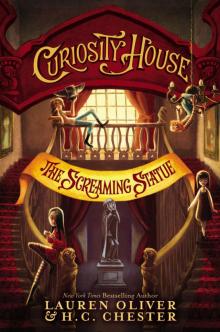 The Screaming Statue
The Screaming Statue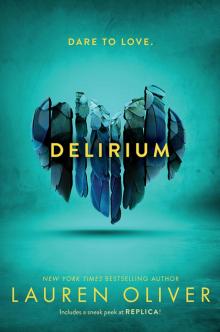 Delirium
Delirium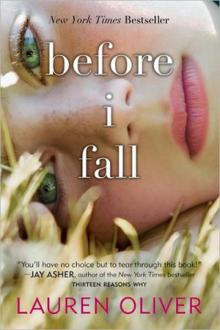 Before I Fall
Before I Fall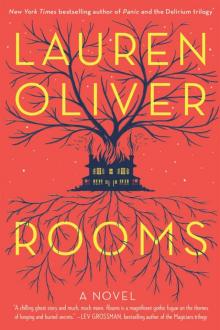 Rooms
Rooms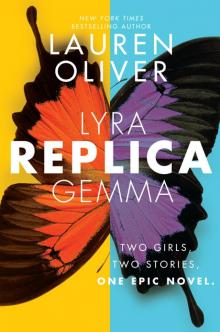 Replica
Replica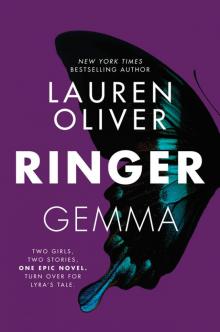 Ringer
Ringer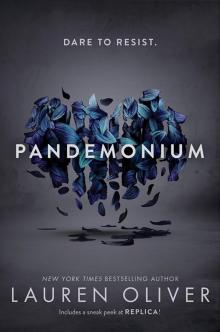 Pandemonium
Pandemonium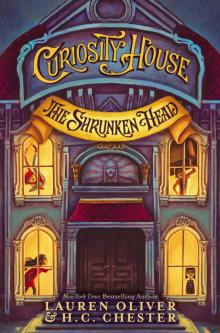 The Shrunken Head
The Shrunken Head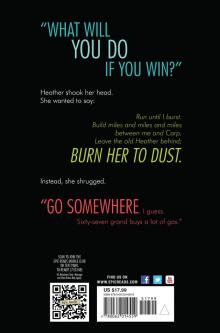 Panic
Panic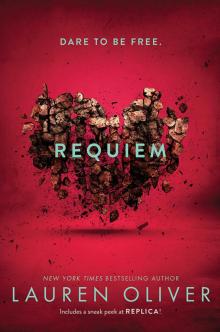 Requiem
Requiem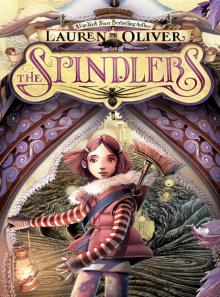 The Spindlers
The Spindlers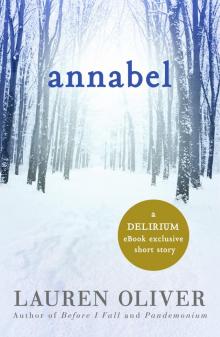 Annabel
Annabel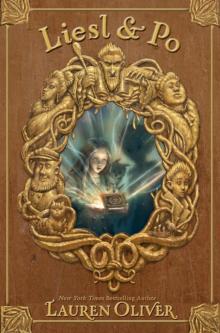 Liesl & Po
Liesl & Po Raven
Raven Alex
Alex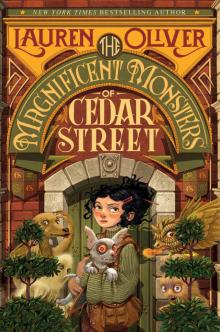 The Magnificent Monsters of Cedar Street
The Magnificent Monsters of Cedar Street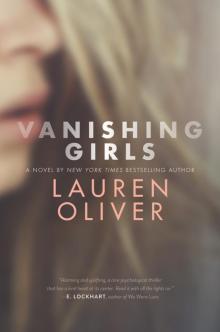 Vanishing Girls
Vanishing Girls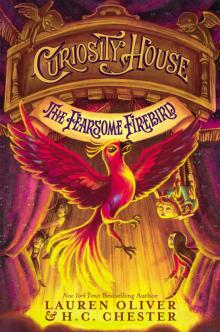 The Fearsome Firebird
The Fearsome Firebird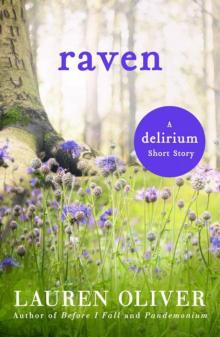 Raven: A Delirium Short Story
Raven: A Delirium Short Story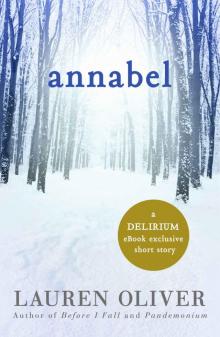 Annabel: A Delirium Short Story
Annabel: A Delirium Short Story Hana: A Delirium Short Story
Hana: A Delirium Short Story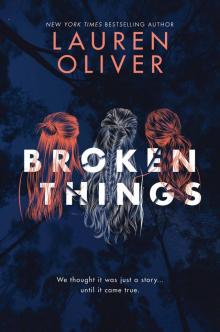 Broken Things
Broken Things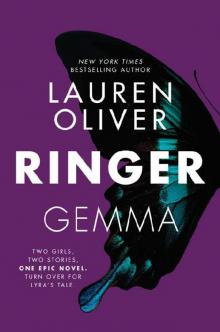 Ringer (Replica)
Ringer (Replica) Alex (delirium)
Alex (delirium)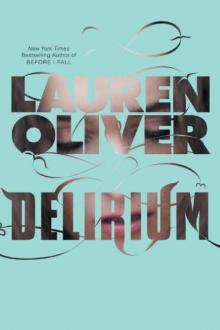 Delirium dt-1
Delirium dt-1